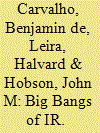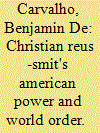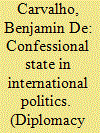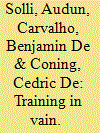| Srl | Item |
| 1 |
ID:
105932


|
|
|
|
|
| Publication |
2011.
|
| Summary/Abstract |
International relations as we know them emerged through the peace of Westphalia, and the discipline of International Relations emerged in 1919 and developed through a First Great Debate between idealists and realists. These are the established myths of 1648 and 1919. In this article we demonstrate how historical and historiographical scholarship has demolished these myths, but that the myths regardless are pervasive in the current textbooks that are used in teaching future IR scholars. Disciplinary dialogue seems to have failed completely. Based on a detailed reading of the myths and their perpetuation, we discuss the consequences of the discipline's reliance on mythical origins, why there has been so little incorporation of revisionist insight and what possibilities there are for enhancing the dialogue.
|
|
|
|
|
|
|
|
|
|
|
|
|
|
|
|
| 2 |
ID:
054168


|
|
|
| 3 |
ID:
134446


|
|
|
|
|
| Summary/Abstract |
Whilst religion and collective identity have become issues of central concern to international relations scholars, dynastic concerns and national interests still dominate their analyses of early modern international politics. This analysis contributes to the constructivist emphasis on collective identity to foreign policy by examining Tudor England in light of the concept of confessionalisation. Based on the recent historiography of Tudor England, this analysis demonstrates the importance of religion in defining not only the collective identity of international actors, but also their foreign policies, choice of alliances, and, more generally, their international outlook. Through such a lens, it seeks to draw analyses of the confessional state away from their focus on domestic state formation to the “external” dimension of confessionalisation and its importance for international politics.
|
|
|
|
|
|
|
|
|
|
|
|
|
|
|
|
| 4 |
ID:
106779


|
|
|
|
|
| Publication |
2011.
|
| Summary/Abstract |
UN peacekeeping missions suffer from cumbersome recruitment processes, high vacancy rates and a shortage of civilian staff. This article explores the bottlenecks hampering the recruitment and deployment of trained personnel, especially civilians. Paradoxically, an increased number of trained personnel has not translated into higher deployment rates. Individual factors and structural bottlenecks together accounted for half of the non-deployments. Of the latter, the informal nature of the UN's recruitment system and the central role played by personal contacts stands out. The article makes the case for an improved link between the recruitment architecture of the UN and its training programmes, and a significant overhaul of the UN recruitment architecture per se. Unless the UN and international training programmes address this paradox, the risk of training in vain will remain.
|
|
|
|
|
|
|
|
|
|
|
|
|
|
|
|